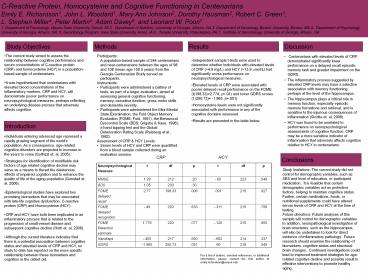Style B 36 by 48 wide - PowerPoint PPT Presentation
1 / 1
Title:
Style B 36 by 48 wide
Description:
1. Department of Psychology, Wayne State University, Detroit, MI 2. Department ... the Mini-Mental State Examination, the Fuld Object Memory Evaluation (FOME; ... – PowerPoint PPT presentation
Number of Views:37
Avg rating:3.0/5.0
Title: Style B 36 by 48 wide
1
C-Reactive Protein, Homocysteine and Cognitive
Functioning in Centenarians Emily E. Richardson1,
John L. Woodard1, Mary Ann Johnson2, Dorothy
Hausman2, Robert C. Green3, L. Stephen Miller4,
Peter Martin5, Adam Davey6, and Leonard W.
Poon7 1. Department of Psychology, Wayne State
University, Detroit, MI 2. Department of
Nutrition, University of Georgia, Athens, GA 3.
Department of Neurology, Boston University,
Boston, MA 4. Department of Psychology,
University of Georgia, Athens, GA 5. Gerontology
Program, Iowa State University, Ames, IA 6.
Temple University, Philadelphia, PA 7. Institute
of Gerontology, University of Georgia, Athens,
GA
Study Objectives
Methods
Results
Discussion
- Participants
- A population-based sample of 244 centenarians
and near-centenarians between the ages of 98 and
108 (mean age 100.5 years) from the Georgia
Centenarian Study served as participants. - Instruments
- Participants were administered a battery of
tests, as part of a larger evaluation, aimed at
assessing general cognitive functioning, memory,
executive function, gross motor skills and
dementia severity. - Participants were administered the Mini-Mental
State Examination, the Fuld Object Memory
Evaluation (FOME Fuld, 1981), the Behavioral
Dyscontrol Scale (BDS Grigsby Kaye, 1996), a
hand tapping test and the Global Deterioration
Rating Scale (Reisberg et al., 1982). - Assessment of CRP HCY Levels
- Serum levels of HCY and CRP were quantified from
a blood sample collected during an evaluation
session.
- Independent sample t-tests were used to determine
whether individuals with elevated levels of CRP
(gt4.9 mg/L) and HCY (gt13.9 ?mol/L) had
significantly worse performance on
neuropsychological measures. - Elevated levels of CRP were associated with
poorer delayed recall performance on the FOME
(t(198.33)2.774, plt.01) and lower GDRS scores (t
(200.73) -1.965, p.051). - Homocysteine levels were not significantly
associated with performance in any of the
cognitive domains assessed. - Results are presented in the table below.
- The current study aimed to assess the
relationship between cognitive performance and
serum concentrations of C-reactive protein (CRP)
and homocysteine (HCY) in a population-based
sample of centenarians. - It was hypothesized that centenarians with
elevated blood concentrations of the inflammatory
markers, CRP and HCY, will demonstrate poorer
performance on neuropsychological measures,
perhaps reflecting an underlying disease process
that adversely affects cognition. - Individuals entering advanced age represent a
rapidly growing segment of the world's
population. As a consequence, age-related
cognitive disorders are projected to increase in
the years to come (Solfrizzi et. al, 2005). - Strategies for identification of modifiable risk
factors of age related cognitive decline may
serve as a means to thwart the deleterious
effects of impaired cognition and to enhance the
quality of life of the aging population (Gunstad
et. al, 2006). - Epidemiological studies have explored two
promising biomarkers that may be associated with
late-life cognitive dysfunction, C-reactive
protein (CRP) and Homocysteine (HCY). - CRP and HCY have both been implicated in an
inflammatory process that is related to the
progression of small-vessel disease and
subsequent cognitive decline (Hoth et. al, 2008). - Although the current literature indicates that
there is a potential association between
cognitive status and elevated levels of CRP and
HCY, no study to date has reported on the more
specific relationship between these biomarkers
and cognition in the oldest old.
- Centenarians with elevated levels of CRP
demonstrated significantly lower performance on a
delayed recall episodic memory task and greater
impairment on the GDRS. - The inflammatory process suggested by elevated
CRP levels may have a selective association with
memory functioning, perhaps at the level of the
hippocampus. - The hippocampus plays a critical role in memory
function, especially episodic memory formations
and retrieval, and is sensitive to the injurious
consequences of inflammation (Sicotte et. al,
2008). - HCY was found to be unrelated to performance on
neuropsychological assessments of cognitive
function CRP may be a more sensitive indicator
of inflammation that adversely affects cognition
relative to HCY in centenarians.
Introduction
Conclusions
CRP
HCY
Study limitations The current study did not
control for demographic variables, such as SES
and level of education, or participant
medication. It is feasible that certain
demographic variables act as protective factors,
helping to maintain cognitive status. Further,
certain medications, foods, or nutritional
supplements could have altered serum levels of
CRP and HCY at the time of testing. Future
directions Future analyses of this sample will
control for demographic variables. In addition,
neuropathological investigation of brain
structures, such as the hippocampus, will also be
undertaken to look for direct evidence of
inflammatory pathology. Future research should
examine the relationship of biomarkers, cognitive
status and structural brain changes. Continued
investigations could lead to improved treatment
strategies for age-related cognitive decline and
possibly result in effective interventions to
promote healthy aging.
For a list of studies, selected references, or
additional information, please contact the first
author at emily.richardson_at_wayne.edu































